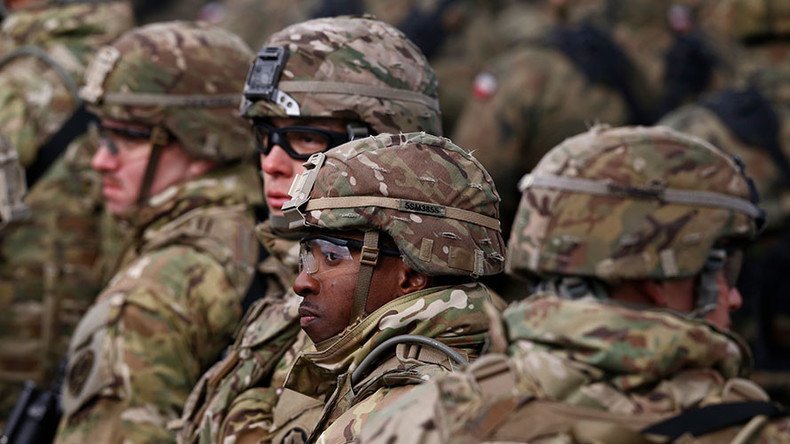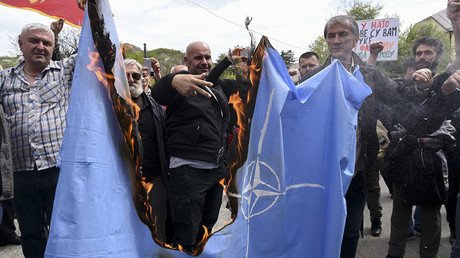NATO mission creep on road to Russia reaches Montenegro

This week’s vote by Montenegro’s parliament to ratify the protocol for the tiny Balkan nation’s admittance into the NATO alliance was a cruel irony.
Less than 20 years ago, during the Kosovo War, when the country was still part of Serbia, NATO jets were pounding Montenegro with depleted uranium bombs. Those bombs caused long-term damage to the nation’s health, which doctors today have linked to increases in systemic cancers among the population. Unsurprisingly, there remains some deeply anti-NATO feeling in the country today — and NATO membership is a hugely divisive issue.
Nonetheless, Montenegro’s government decided to forgo a referendum on NATO membership, denying the country’s citizens any say in the matter.
Why Montenegro?
American lawmakers have been enthusiastically anticipating Montenegro’s arrival into the alliance, but it has little to do with the country being of any significant military value — because Montenegro delivers absolutely nothing to NATO in terms of military strength. The country’s 2,000 troops are hardly a big draw, though its location is strategically significant and would give NATO almost full control of the Adriatic Sea, given that Italy, Croatia and Albania are already members).
The country is also unlikely to be facing down any major military threats from which it would need NATO’s protection. Nor are there any legitimate reasons to claim that Montenegro has any value to the US in terms of its national security interests.
The reasons for Montenegro’s ascension into NATO are therefore largely symbolic. Admitting the tiny Adriatic country as the bloc’s 29th member sends the message that the US-led alliance’s open door policy remains in place. It’s an opportunity to convey that the US ‘sphere of influence’ is ever-expanding and limitless. It’s the geopolitical equivalent of Washington sticking its tongue out at Russia and making childish noises to confirm its superior level of coolness. In other words, as one analyst noted, NATO is adding new members the way people add Facebook friends that deliver zero value or relevance to their lives, but the higher the number, the more popular you look.
Indeed, the Washington-based conservative think tank The Heritage Foundation argued in a recent paper that Montenegro’s membership would “send a message” of strength to Russia. If that’s the best reason they can come up with to justify adding a militarily insignificant new member to a military alliance, it’s a pretty weak case.
When the US Senate was debating Montenegro’s membership, avid warmonger and notoriously delusional senator John McCain accused Senator Rand Paul of“working for Putin” simply because he was against the country joining the bloc. This kind of baseless outburst only confirms that the likes of McCain and other pro-NATO expansionists have no real arguments to fall back on if they can only meet legitimate disagreements with accusations of “working for Putin”.
Shift to the West?
There is a clear temptation in Western reports to explain the move by Montenegro’s parliament as a ‘shift to the West’ for the country, but it is hardly so straightforward.
The opposition Democratic Front alliance believes that the government won’t allow a referendum on the issue because they would lose. This is not unlikely. Polls have shown that Montenegrins are deeply divided over whether to enter NATO. Anti-NATO members of parliament boycotted the vote and several hundred people showed up outside to protest it, chanting “treason!” and “thieves!”. One banner seen in photographs read: “Nato killers, you have blood on your hands.” The opposition say they will freeze the country’s membership if they win the parliamentary elections in 2021.
#Montenegro’s current leadership & its Western sponsors ultimately failed to heed the voice of reason and conscience https://t.co/hT6gmt8wHApic.twitter.com/cYfYEhncNB
— MFA Russia 🇷🇺 (@mfa_russia) April 29, 2017
Montenegro is a notoriously corrupt country. Former prime minister Milo Djukanovic who ruled the country for 25 years (save a few short interruptions) has been accused of using the country as his own personal ATM and of muzzling the press. In 2009, he was implicated in a cigarette smuggling ring that reportedly laundered $1 billion in profits, but was never charged. In 2015, he earned himself the title “man of the year in organized crime” by the Organized Crime and Corruption Reporting Project.
Djukanovic called the October 2016 election a “referendum on NATO membership” — but the vote which sealed the nation’s fate regarding NATO membership was marred with serious allegations of fraud. One opposition leader called it “the most fraudulent we've ever had”. At the time, the EU called for an investigation, though in reality Brussels and Washington turned a blind eye given that the election results suited their own agenda. Similarly, the media weren’t overly interested the previous year when Montenegrins took to the streets to protest the pro-EU/NATO government.
The value placed on anti-corruption protesters around the world seems to be decided based more on their value to Western geostrategic interests than anything else. If those Montenegrins had been protesting a government regarded as friendly with Moscow, there would have been no end to the coverage — and no doubt, some American officials would have shown up in Podgorica to show their support.
Blaming Russia
Djukanovic stepped down and was replaced as prime minister by his ally Dusko Markovic after his party won the October election. Djukanovic has been eager to portray NATO membership and Russian influence as the biggest issue facing Montenegro. On election day, he announced there had been an attempted coup and Russian plot to assassinate him, with the aim being to prevent Montenegro’s entry into NATO.
Opposition parties say this “coup” was a fabrication; an attempt to rally support as people went to the polls. Knowing how well anti-Russian sentiment plays in the West these days, perhaps he thought a fake Russian plot would be a good way to get some attention.
#Montenegro defies democracy by ratifying NATO membership without referendum – Moscow https://t.co/OIMgr7ngKC
— David Icke (@davidicke) April 29, 2017
It’s unlikely however, that Moscow sees the minuscule addition of Montenegro’s 2,000 troops as reason enough to assassinate a foreign leader to prevent it from happening — particularly when Vladimir Putin is already busy running rings around the rest of the world and hacking everything with an electric current.
Of course, Russia is not exactly delighted about Montenegro joining NATO — Moscow is against NATO expansion in general — but Putin is hardly quaking in his boots over this particular addition to the Western social club.
Given that NATO found itself without purpose in 1991 after the fall of the Soviet Union, it has struggled to maintain its relevance. This is why it engages in hair-brained and disastrous ‘humanitarian interventions’ in countries like Libya. It is also why NATO perpetuates the ridiculous notion of Russia as an existential threat to the Western world. NATO’s goal is to perpetuate its existence and stay relevant. Everything it does is in pursuit of this goal.
Adding members like Montenegro purely in an attempt to antagonize Russia is foolish. It serves only to confirm to Moscow that Washington disregards its interests and security — which ironically, could cause more instability to NATO than any benefit gleaned from adding Montenegro.
Then again, for all the talk NATO does about security and stability, it seems to benefit most from exactly the opposite.
The statements, views and opinions expressed in this column are solely those of the author and do not necessarily represent those of RT.














